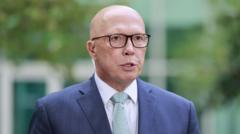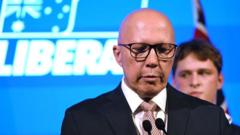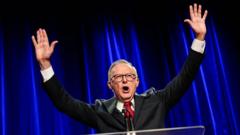The opposition leader acknowledged a misstep in his party's policy, promising no changes to flexible work arrangements and clarifying plans to cut public service jobs through natural attrition, amidst a backdrop of rising voter concerns about cost-of-living issues.
Australia's Opposition Leader Reverses Work-from-Home Policy After Public Outcry

Australia's Opposition Leader Reverses Work-from-Home Policy After Public Outcry
Peter Dutton, the leader of Australia's opposition, rescinds a controversial election pledge to end remote work options for public servants following widespread criticism.
Australia's opposition leader, Peter Dutton, has made a significant policy reversal by abandoning an election promise to terminate work-from-home options for public servants. This decision comes on the heels of strong backlash from the public and criticism from the incumbent Labor government. During a press conference on Monday, Dutton acknowledged that the Liberal-National Coalition "got it wrong" and offered an apology for the proposal.
The policy was initially integrated into the Coalition’s broader election strategy set for May 3, which included significant job cuts aimed at enhancing efficiency within the public sector. However, critics highlighted that ending remote work arrangements would disproportionately affect women, prompting widespread disapproval among voters. Dutton clarified that the policy was supposed to apply only to public service workers in Canberra, accusing Labor of misrepresenting the issue in what he termed a "smear campaign."
In response to the uproar, shadow finance minister Jane Hume emphasized that the Coalition would now advocate for maintaining current flexible working arrangements, acknowledging the importance of remote work in maximizing workforce productivity. The Coalition has also clarified its contentious proposal to reduce 41,000 public service jobs, previously seen as a drastic measure that could involve forced redundancies. Hume stated that any reductions would be achieved over the next five years through a hiring freeze and natural staff turnover, although Dutton seemed to contradict this interpretation by suggesting that the policy had not been clearly communicated.
As the campaign unfolds, the Labor government quickly capitalized on the policy changes, with Employment Minister Murray Watt criticizing Dutton's inconsistency. He remarked that while Dutton might attempt to alter his public image, he cannot change his fundamental nature or stance as a leader.
Globally, there has been a recent push by some governments and corporations to enforce a return to in-office work, yet polling in Australia indicates that voters are primarily focused on pressing cost-of-living challenges. This context sets the stage for a dynamic electoral landscape as Australians approach the upcoming elections.



















